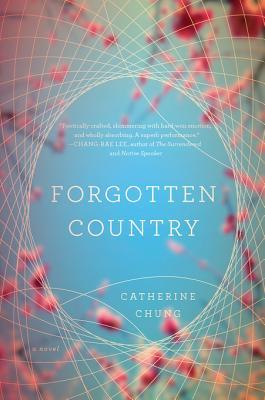
Forgotten Country
کتاب های مرتبط
- اطلاعات
- نقد و بررسی
- دیدگاه کاربران
نقد و بررسی

Starred review from December 12, 2011
In this beautiful debut novel, sisters Janie and Hannah demonstrate very different reactions to their Korean parents and heritage. The dutiful Janie has carried the weight of having to look after the more manipulative but possibly more lovable Hannah since childhood. Woven with tender reflections, sharp renderings of isolation, and beautiful prose, the story traces Janie’s and Hannah’s Midwestern upbringing. Tensions rise when Hannah intentionally disappears while away at college. Janie, haunted by her grandmother’s warning that in their family, a sister from each generation always vanishes, tries to find her, though Hannah makes it clear she doesn’t want to be found. Chung simultaneously shines light on the violence of Korean history, the chill of American xenophobia, and the impossibility of home in either country. “In Korea, couples dress alike to show the world that they’re together. Families, sisters, teams, groups—delight in wearing a uniform.... Here is the lesson: nothing is more important than belonging.” Though both sisters know this to be true, they struggle with how to make peace with one another and their past until an unanticipated trip to Korea allows everyone to see more clearly. Agent: Maria Massie, Lippincott Massie McQuilkin.

February 15, 2012
A young woman struggles to understand her sometimes-competing roles as daughter, sister, scholar and Korean American in Chung's darkly luminous debut. Twenty years ago Janie and Hannah moved with their parents to Michigan to avoid reprisals by South Korea's then-authoritarian government against their brilliant mathematician father's incendiary political pamphlet. Janie, now a graduate student in mathematics in Chicago, has always grudgingly accepted the way her family considers it her responsibility as older sister to protect more openly rebellious Hannah. When Hannah drops out of college and takes off for California, cutting off communication with her traditionally tight knit family, Janie is furious. Then her father is diagnosed with a form of cancer best treated, ironically, in Korea. Dispatching Janie to find Hannah and break the news, her parents return to Korea. Janie finds Hannah thriving in Los Angeles. During a quarrel, Janie claims their parents are done with Hannah and tells her not to come to Korea. To Janie's surprise, Hannah acquiesces and stays behind. Janie arrives in Korea alone, claiming Hannah couldn't get away. Ensconced with her parents in a lovely Korean home and visited by devoted (if sometimes rancorous) family and friends, Janie develops a deeper appreciation for her parents' history, particularly her father's. His health seems to improve, and she luxuriates in his approval and her role as the good daughter. But when his condition suddenly worsens, Janie's mother calls Hannah herself. Hannah comes immediately, and, to Janie's chagrin, the family embraces her as if she never deserted it. As their father's health deteriorates, Janie and Hannah's sibling rivalry comes to a head, but their bond is stronger than either has recognized. Despite some missteps into cliches about abuse, Chung delves with aching honesty and beauty into large, difficult questions--the strength and limits of family, the definition of home, the boundaries (or lack thereof) between duty and love--within the context of a Korean experience. Chung's limpid prose matches her emotional intelligence.
COPYRIGHT(2012) Kirkus Reviews, ALL RIGHTS RESERVED.

October 15, 2011
When sister Hannah pulls a vanishing act, Janie recalls her grandmother telling her that since the Japanese occupation of Korea a daughter has gone missing from the family in each generation. One of Granta's New Voices, Chung uses folklore in this promising debut likely accessible to a wide range of readers.
Copyright 2011 Library Journal, LLC Used with permission.

Starred review from January 1, 2012
Moving among feelings from reserved to exuberant and from easy joy all the way to devastating pain and loss, Chung's superb debut examines the twin hearts of cruelty and compassion between sisters in particular and family in general. Korean immigrant and grad student Janie, born Jeehyun, and her younger sister, Hannah, known as Haejin in their native tongue, struggle to maintain even the veneer of a sisterly bond as they at times gracefully float together, then violently come apart, throughout their lives. When Hannah abruptly disappears from the family fold, Janie is charged by their father with finding her and bringing her back. Haunted by childhood memories of her grandmother's story about the family being cursed with lost sisters for generations, Janie feels compelled to find Hannah yet bitterly resentful as well. A second harrowing blow to the family lends urgency to Janie's search while providing deeper introspection about the fragile and implacable bonds that hold a family together even across the seemingly impassable chasm of different cultures and changing generations. This elegantly written, stunningly powerful, simply masterful first novel should earn Chung many fans, especially among those who enjoy Amy Tan, Eugenia Kim, Lisa See, and Chang-Rae Lee.(Reprinted with permission of Booklist, copyright 2012, American Library Association.)

























دیدگاه کاربران